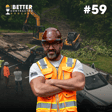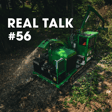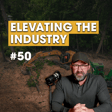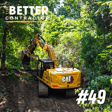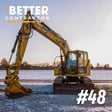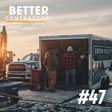Become a Creator today!Start creating today - Share your story with the world!
Start for free
00:00:00
00:00:01

When to Buy: Insights from Vermeer’s Andrew Fiala on Equipment Strategy
In this episode of The Better Contractor, Brent and co-host Travis, "The Professor," speak about the complexities of equipment purchasing with Andrew Fiala from Vermeer Midwest. Learn how contractors can strategically decide when to buy, maintain, or turn over machinery, and explore the evolving role of technology in managing fleets. Whether you're an established contractor or just starting, this episode offers actionable insights into maximizing the value of your equipment investments.
#ContractorLife #EquipmentManagement #VermeerMidwest #FleetStrategy #BlueCollarIndustry #Landscapers #TreeCare #BlueCollar #TheBetterContractor
Transcript
Introduction and Episode Overview
00:00:14
Speaker
Welcome back to another edition of The Better Contractor. Today I'm joined by Andrew with Vermeer and my co-host Travis aka The Professor. Today, we're going to talk a little bit about equipment. So equipment ah ROI, when to buy, a cost analysis, and then innovation and trends. All things that are important to you guys listening, because that's something we all struggle with, is when to buy it, um what is upcoming, and then what is the cost analysis I should be looking at. A lot of people don't look at that. So today, we're going to dive into those topics with Andrew from Vermeer and Travis, the professor.
Vermeer Equipment and Andrew's Career Journey
00:00:49
Speaker
So Vermeer is a company that we've used some at Lanarkorp as well. We use a lot of their chippers, wood chippers, but they do a host of like forestry equipment, environmental equipment, construction equipment. We'll start with Andrew. Tell us a little bit about yourself, how you got into the industry as a whole.
00:01:06
Speaker
Yeah, so um I went to the University of Missouri for school and about halfway through that I was home for Christmas break and the general manager of one of the stores within Vermeer Midwest. um We had a previous relationship with him. My family did and he just asked if I Needed some Christmas break work and just some grunt work in the shop and cleaning up after tax, running parts, you name it. And it just kind of snowballed from there. Did that for a couple more winter breaks and summers and learned to the part side of things, stock shelves, unpacked stock orders. And then when I graduated a position
00:01:51
Speaker
came open, I applied and the rest is history. So actually been here for or been with Vermeer Midwest full time and sales now for six years today on the 14th. So congratulations. Yeah, thank you. Appreciate it. That's cool.
Strategic Equipment Purchases
00:02:08
Speaker
Well, Hey, one of the things we talked about a little bit, uh, pre-podcast was knowing when to buy. So obviously you're a salesperson. So one would think that you would probably tell us by now all the time. Um, but there's a little bit more strategy involved with that and you're aware of that. So I was kind of curious to know from you, what, what do you think? Like a lot of people will overextend. Um, I'm a contractor, a bunch of us will get to year end and be like, well, yeah I don't really want to pay this tax. So I'm going to buy a piece of equipment that's nice and shiny and new. And I'll section 179 that at the end. And all of a sudden next year, you don't really need that piece of equipment, but kind of curious to see.
00:02:49
Speaker
your thoughts on that a little bit. Yeah. So I mean, end of the year is obviously ah like you just said, very popular time to buy. I mean, really the whole idea of when to buy what's the right time is so dependent on so many different variables of the customer and the situations that they're in and how long they've been in business and um you know um how many seasons do they got under their belt, all that.
00:03:16
Speaker
and you know We deal with a wide variety of customers from oh you know large household names down to the um one-off Joe Blow guys who are just doing it on the side and are weekend warriors. So I mean, that really plays a role into that. And you know because you need to, just like with any business, you want to walk before you run. And what we've seen happen Um, you know, quite a few times is, and it it happens a day to day, you know, somebody sees a nice shiny new car, they can't afford it, but man, that's a good looking car. I'm going to go ahead and get it. And it's not what they should be doing financially or, um, and it's the same thing applies
Equipment Pricing and Market Strategies
00:04:02
Speaker
to business. So, you know, starting out.
00:04:05
Speaker
If you can you know find a good used piece or if you already have the capital, great. But for most people starting a new business, it behooves them very well to start used, work your way up. um you know You don't need to go out and buy a ratted out.
00:04:22
Speaker
Juncker, but there's definitely ways, you know, doing your homework and your due diligence of finding what you need to suffice and grow and meet the market and customer base you're trying to grow initially. And again, it all boils back to walking before running.
00:04:44
Speaker
you know and you want to get past that one to buy you know tax season like you said is always a popular time for everybody and you know price point wise if you can purchase in the winter or early early spring. um From a sales point. um You know you're better.
00:05:04
Speaker
youre better ah your likelihood of getting a cheaper price is probably around that time. just you know when you're When you're in the mix of or the heat of summer, you know everybody's go, go, go. um Inventory, the trend has been, at least since I've been here the last six years, inventory usually gets tight.
00:05:25
Speaker
June, July, May, June, July, August, September roll around, start slowing up a little bit. People go back to school. um you know Inventory becomes a little more readily available. But you know long story short, in the ah prime time, um you know summertime, that's when you know prices are probably going to be higher, again, based off of what inventory is for dealerships.
00:05:52
Speaker
But you know it just, again, depends on where what stage you're in as a business owner, a company, um you know and what you can afford truly to you know stay efficient and stay you know fundamentally and financially um above water.
00:06:15
Speaker
Yeah. And what one thing I was curious of, and you see a lot of larger and contractors will do this, but they have more of a fleet or equipment turnover plan, like for sure trucks, you know, hit this amount and we flip it over. Um, what is something like you guys would recommend or what, what are you seeing as a big difference in that area for like some of your large customers and how quickly they may turn over a chipper or, you know, some other, you know, a mini skid or whatever. Yeah.
00:06:42
Speaker
So ah most equipment out there these days has some form of telematics is what it's usually called, which it's got a GPS system and some database you can log into to um' track hours and um service intervals and um you know fuel consumption. And again, just a simple GPS. That's something that most equipment companies offer, including us.
00:07:08
Speaker
um you know we all with that there's you know maintenance plans that come with that as well and what larger companies are starting to do to keep track of all that is you know you buy a piece of equipment, you get your maintenance intervals with them, whether it's two years or three years. Once you're you've hit those or once you've completed your maintenance cycle on you know the maintenance plan you've purchased, then they go and turn that machine over because you have another
00:07:44
Speaker
you know, value points on that used piece that you've depreciated out now. You have proof of, you know, the dealership did the service here, here, here. And, you know, this is why my machine is worth more than, you know, this other piece on Facebook Marketplace or wherever it's at. So, um that's been very big for especially the bigger customers with more units to keep track of. um Because again, it's just another um data point. It's another um reminder. It's another truth teller. um And again, at the end of the day, when they go to turn over and sell, it's another um selling point or value adder to why, you know, their piece of equipment is worth this versus that.
00:08:34
Speaker
So one thing on that, Andrew, that's a good point. So I know, you know, even Atlanta Corp, as we've grown, we've kind of looked a lot at that exactly. So when is the opportune time to turn over this, this specific piece of equipment? Is it when the warranty is over? Is that at a certain number of hours? Uh, is that when it reaches a certain point? Is that when I depreciate it out of my books? You know, what does that look like? Um, what have you seen like with some of your larger clients, do they have kind of a mathematical formula that they look at there? Is it when the warranty is over? Um,
00:09:04
Speaker
Cause I know like for us, there's obviously the cost of ownership. The item is becoming an asset on your books, but at the same time, at some point there's that middle point where I say, Hey, this item is costing me X, but I now have X amount of maintenance costs that are now involved. so So now that item is actually costing me a little bit more per month than maybe a newer one, because not only do I have those maintenance costs, but now my project is delayed or my crew is down because that piece of equipment is down.
00:09:33
Speaker
what do What do you think on that, or what are you seeing out there with your larger clients? Yeah, for sure. I would say with the larger clients, it is ba warranty-based is a big driving factor of that. Where the used market value is, is a very large driving factor in that as well, because we've seen that obviously shift.
00:09:53
Speaker
dramatically in the last year versus what it was two or three years ago. um But to answer your question, yes, a lot of the larger contractors are purchasing equipment. They're getting a um either a confidence plus plan, which is maintenance, or they're getting extended warranty, or if they have an in-house mechanic, they'll keep it for the duration of the standard warranty maybe a year after that.
00:10:19
Speaker
And correct, turning it over from there because, um you know, again, that's, that's usually the sweet spot for maximum value in the used market. Yeah, I would agree. We, you know, even inside Atlanta Corp, we had a brand that we buy. It's not Vermeer on this one. It was full size skid steers. And you know, so we went through, we always just had done a lease in the past.
00:10:45
Speaker
Well, then during COVID, when the used market skyrocketed, you know, we went through and said, Hey, actually at the end of this lease, we can actually buy this item at lease ends. And actually it is worth quite a bit more than the, than, you know, the other. So we ended up buying them now, but we only run them about a year or two after with the extended warranty. And then we'll turn those things in as well. So yeah it's like you said, it's very much, uh, what also, so it's like a combination of used market value and then also, you know, my warranty. So, absolutely you know,
00:11:16
Speaker
We've got a bunch of competition in our world where they go through and you'll see them run this super old equipment. And then maybe we get to bid the next year or whatever, but the feedback oftentimes is, well, the other contractor had this super old equipment. It was wrote down all the time. So yeah, they bought that piece of equipment used for 50,000 and the new one's 220,000. But, you know, they just lost the contract. Number one, number two, they spend a ton of time and maintenance fees cost. Uh, and number three, the crew wasn't billable. So yeah. So anyway.
Role of Telematics in Equipment Management
00:11:46
Speaker
Guys listening, you got to keep all that in mind. It is not just the input cost of, hey, this piece of equipment is $220,000. There are so many more end inputs to consider in that as well. And it's going to be, I wish I could just give you a formula, but it's going to be different for, like Andrew said, every piece of equipment, type of equipment, trucks versus a trailer. Some stuff can be rebuilt. Like we actually rebuilt some of our trailers quite a bit because it's mostly axles and stuff like that. So in powder coat. So Travis, you've been kind of quiet. What questions do you have?
00:12:15
Speaker
But as far as software and being able to monitor your equipment, it's been around for five, 10 years or so. And I think we've seen definitely the evolution and just get more powerful, with more data points and be able to tell more about what you're doing. But there's, I know speaking to several companies, especially last year too, um there was still apprehension about using it in that yeah it's very software based, technology based, computer based. And you've got a lot of these legacy companies that want nothing to do with adding more technology and more software and doing anything with, especially on a day-to-day or operational basis. So are you seeing that change? What's the adoption rate of people more open to it, or finding it and seeing the value in it and using it more ah now, or is there still kind of a learning and education and awareness phase that we're in?
00:13:07
Speaker
So people are becoming a lot more receptive and accepting of you know these telematics, maintenance checkpoints, you know all this information, especially you know companies like Landrecorp or bigger outfits that are going nationwide or going to you know state to state, you know chasing after storm damage, hurricane work, the you know disaster relief, or even as these companies grow, um they go after this larger work. And again, it spreads them all out further and further. um And ah yes, to answer your question, it has become with those people and those customers a ah very, very essential and necessary
00:13:57
Speaker
piece to their efficiency and operation. Now, for maybe a smaller guy, a one-off guy, it's definitely a harder push um because you know if they got one machine, two machine, three machines, you can kind of keep track of that. But again, you get into these larger larger outfits and operations, it is becoming a necessity to, you know like me and Brent talked about,
00:14:22
Speaker
you know be part of how they determine when to turn machines over. And again, you you build up a fleet so large that um you know you almost have to have a position just for that if you don't have these telematics in place or um you know this information readily available. and So i'm I'm a huge proponent of technology and technology implemented smartly. um And there's definitely a place for that. And this, I think, falls into one of those realms that we just haven't had the opportunity to implement stuff like this in the past, where I call it superpowers. And especially with the the the smaller organizations versus the larger ones. Larger ones typically are more prone to doing data and software and looking at at innovations of technology to help augment things. It's the smaller companies that there's potentially a lot more benefit there. They can do a lot more with less if they understand it. They know what it is, how to use it,
00:15:23
Speaker
and how to implement it correctly. And it ultimately augments historically in all of our industries. You go by gut. Whoever's been around, whoever's had the most experience, who's ever had the hands on, the most jobs, the most seasons, that's just really tough to scale. That's really tough to replicate. It's tough to instill. You can't rely on that. And especially if you can't explain it. And that's where a lot of the software and the data can help augment that. It helps make sense.
00:15:52
Speaker
for things like, well, this this is where you you sell the equipment. This is how you optionally use it. This is where what's making money. This is what isn't. um And it can help augment the gut feeling in those who have had the time in the seats. And that's where I think for any of the organizations, that are especially small i think it's the smaller ones that have that aversion to it. And I think that's where some of the ah companies, if they can figure that out and adopt it, figure out where it makes sense. How are people using it and adopt smartly it It's a force multiplier for them. They can do more than what they have or have insights into things they've never been able to have insights into you and then leverage that to do things more efficiently, more optimally, better profit. And it's something that's absolutely worth looking into and learning about. And we're just kind of in this unique
00:16:51
Speaker
sweet spot where the technology has caught up to the industry where it is useful. It is more widely widely available and the price points have come down to where like the software you're talking about. It's absolutely integrated into most stuff now. It's just kind of part of it and it's so powerful if people are using it right and it's absolutely worth for for the companies that I have talked to that use that kind of stuff and that I've seen. It's it's a game changer for them and so maybe a little bit up front investment in learning it or finding the right staff, maybe it's younger staff or people that are more technologically inclined, put them on it, ah but it'll pay for itself and the ah ROI is ah substantial once you figure it out.
00:17:35
Speaker
Absolutely. And and you know if you can if you can come to, um you know come prepared a breakdown of, you know this is what your cost is at 250 hours for a service. This is what it'll be at 500, 750, a thousand hours you know for service intervals and this maintenance plan, you know whether it's just maintenance or this extended warranty, whatever it is, is halfway paid for. Now,
00:18:00
Speaker
you know you're just gonna come across certain people that are hands-on and you know the way they were you know raised and wired is, if I can't do it myself, I'm not gonna own it, which there's nothing wrong with that mindset at all, but it really is a, you know for for certain people, it is truly teaching a um foreign language to to a degree of you know this, I know what I'm telling you sounds you know, ah unnecessary and or scary, but this is why. And it's just, again, like you were talking about, you know, breaking it down and really diving into um how this can make you profitable and more efficient. Yeah. I think the telematics is huge. I know we adopted it before, like back when you had to pay another company to come in and put the telematics on equipment. Right. And a lot of our workforce at Landicorp is remote, you know, so we may be working on Ohio, New Jersey, wherever where our headquarters is based out of Illinois.
00:18:59
Speaker
Um, so back then it was nice. Like, Hey, our equipment manager, fleet manager here now knows this piece of equipment needs an oil change. This one needs an oil change. These, all of our assets are located here, here, here, and here. Um, that way you know, Hey, this is where our crews are at. This is where assets are at. You can look at a map. Um, but also like we've had theft where we've tracked stuff down and we know where it went and we, we recovered it. Um,
00:19:25
Speaker
But I think the maintenance side, you know, for you guys, and maybe they have not embraced telematics or you have it, but you just don't mess with it. For the maintenance side of things, it's huge. You know, it keeps everything on that routine schedule, which is awesome. If your crew is working a little bit remotely, you know where your stuff's at. I can actually log in and see for most companies, there are most telematic systems I can log in and see if the equipment is running. So you clocked in from eight to five. Did you actually run the equipment from eight to five? You know, stuff like that has been nice for for us over the years. so I think it's a huge tool. If you're not using it, I think you should be.
Impact of Equipment Appearance on Marketing
00:20:00
Speaker
One of the other things we talked about pre-podcast was basically, and people don't think of it this way, so I think when I think of equipment, and I think buying new, I often, my mind goes to your ah ROI, you know, is this piece of equipment, number one, going to pay for itself and then make me a profit? Is it going to make my company be able to do a better job, get something done more efficiently and productive?
00:20:25
Speaker
increased production. If the answer is yes to all that, then you buy the piece of equipment. The one thing you guys have talked about a little bit pre-podcast was marketing and presentation as well. And a lot of people don't realize that one. Not that it has to be brand new and shiny, but I can think of an example just on the street I live on recently. We had a tornado go through here, I don't even know, two years ago, a year ago, I forget when. So there was a lot of roofs getting done around the area after that tornado. So all these roofing contractors are all over the place.
00:20:54
Speaker
And we were looking for one, cause I don't have a relationship here with one of those yet. Um, so it was just, Hey, you know, I'm, so I'm literally just looking around trying to find one that looks reputable. And one of the things I looked for was, Hey, do they actually have like good graphics in their trucks? Are their trucks newer? Do they actually have some equipment like lifts and stuff to get up? We have a really, really steep roof and a hill. So do they have the equipment to get and do my project even. Um, and then I have a safety brain to an extent because of the industry that we're in. Um,
00:21:25
Speaker
Are they going to tie off in my Steve roof in my house as a three story backdrop on the backside? So all those things, but you know, for you, Andrew, what have you kind of seen as far as like the presentation and marketing and how that's impacted your customers? Yeah, I mean, I think it's, you know, it applies to any aspect of life, you know,
00:21:46
Speaker
First impressions stick, um you know, and a lot of the people, a lot of who we're talking to is, you know, you're going into a neighborhood, you've got a call to do a job, whether it's take down a tree, replace a shrub, um lay sod, whatever that is, you're in a residential neighborhood with a ton of tons of homes, your equipment, truck, whatever you're using throughout that day is going to be sitting in that neighborhood for the duration of the project. And a lot of eyes are going to see it. A lot of people are going to pass by it.
00:22:18
Speaker
and I'm still a very large believer in word of mouth business is a is king is key and so what happens nine times out of ten you do a good job you go in there and Before you know it by the end of the day you got four or five other houses coming up to you saying hey Can I get a quote on this can I get an estimate on that? um Are you how soon are you available to do this and it is? it just boils down to you know kind of like what you hit on a you know looking presentable and not necessarily having a brand new shiny machine like you said but um again being presentable doing a good job doing what you say you're going to do making sure you're Um, making can sure what you say has weight and meaning, um, and value, you know, it, again, it really boils down to, you know, simple human relationship skills, just, um,
00:23:18
Speaker
doing what you're supposed to do and doing what you say you're going to do and doing what you're quoting um these homeowners or customers um that you're going to do. And again, you know the word of mouth and the people seeing what you have, the equipment, the trucks, the um again, how you carry yourself just goes so, so far. it's It's kind of like, I don't know if you guys have heard of the 80-20 rule.
00:23:43
Speaker
um 80% of your business comes from 20% of your customers. And that is so incredibly true. Yeah, we see that a lot. We're for a lot of corporations, so a lot of ours is business to business, but we see that a lot. And I think you know to kind of tie this point home a little bit, to me, there a lot of business decisions can be made within a spreadsheet. So for equipment, for example. So we went through this past year, and we kind of redid our rate sheet a little bit. But one of the things we did,
00:24:15
Speaker
was really honed in on all of our costs. So, you know, when it came to the equipment side of that race sheet, what does that actual item cost me? So you, you know, if you're keeping your books and you guys listen, you may need to make sure you keep all this data so you can actually build a spreadsheet like this. But I know, okay, hourly costs, you know, so what does it cost to own that piece of equipment? The most basic, you know, if I'm renting it, I have an hourly cost. If I'm purchasing, I have an hourly cost, or if I'm leasing.
00:24:41
Speaker
you have an hourly cost per month and you know about the number of hours you're going to bill that item for. So that's a simple calculation, put that in there, add in your fuel cost to run that piece of equipment for those number of hours, add in your maintenance history. you know So that piece of equipment last year cost me X amount per year, ah you can divide that out over those hours. Same thing with breakdown. So you're building this hourly cost inside this spreadsheet where you know exactly what that piece of equipment needs to be built for, add in the profit of course,
00:25:09
Speaker
Um, but it also makes it easier to make those decisions upon when to, to purchase a piece of equipment. Um, but the one thing we talk about presentation and marketing, that is an unknown, you know, so that's not something you don't know. I mean, we've had people even with a TBC, the better contract, we've had people say, Hey, how do I know my marketing is paying off? At times, I don't know. There's some things you can run ads, you can do certain things and you can kind of say, Hey, that obviously clearly paid for itself. The one thing yeah is hard to do.
00:25:39
Speaker
is, hey, if I wrap my trucks, if I have all new equipment, how do you know that someone actually drove by and said, you know what, I'm picking this contractor here because, or I'm calling them because, unless you ask, you don't really know the impact that you're having by having that presentation, by having that marketing and stuff out there. Um, so I, that's an unknown cost, I think, but one that needs to be factored in here.
00:26:04
Speaker
Because I think there's a lot of contractors as an industry that have given ourselves a bad name by being honestly just doing crappy work. Um, and then billing people to full price for it, uh, that people are hungry and want to choose a company that will be less likely to do that to them. And I think when they drive by and they see, Hey, they obviously put attention and thought and effort into their marketing, their trucks are clean, you know, their trailer, they swept all the rock off of it before they jumped on the highway.
00:26:33
Speaker
their stuff's actually secured to their trailer. Like I've seen contractors before, i I pass them on the interstate and like, I don't have any respect for them because the rocks are bouncing off the side of the trailer. The equipment's got one strap over the top, which doesn't fit, you know, DOT regulation. You see all these blatant issues, just simply just driving by and observing. So I think, you know, to draw that point home, that is the kind of stuff that matters. yeah And again, like Andrew said, doesn't have to be shiny and new.
00:26:58
Speaker
but it needs to be decent and you guys got to clean that stuff once in a while. So anyway, that's that's kind of my take home point from that. All right. It's not an um absurd assumption that if they're not taking care of their equipment, they're not doing things appropriately with their own tines to stuff down, sweeping it off, keeping it clean. Their stuff looks tidy and professional. It's not an absurd ah leap to think that, are are they cutting corners on the job site?
00:27:26
Speaker
Are they actually doing things professionally when I've got them up on my roof or doing whatever? Is my retaining wall look good, but they cut corners or use shoddy materials or practices, and it's going to fall apart in a year. but So ah yeah, it's it might it might not be an outward ah thing that's expressed, but psychologically, that's but that's the reason it's in the back of their mind. It's basically saying, that attitudeage's basically saying if you if you can't take care of your own stuff,
00:27:55
Speaker
How are you going to take care of my stuff? yeah ai so It's not ah yeah it's so probably a huge departure about your overall mindset about things and how you operate. And you're always selling in that you're either selling people in that they are attracted to you in your business or and and want to engage with you or not, but you're selling them to not be a part of it.
00:28:18
Speaker
when you don't wrap your vehicle and it's just kind of like a stencil thing and it's all beat up and rusted over or whatever. I mean, it's hard to quantify and like you said, where unless you ask, but at the same time as there's probably a threshold in there too, in that you're selling. So if both companies are a hundred percent equal as far as the quality of their work, which one has a little edge and how they present themselves? Are they all wearing the same shirt or Is it a hodgepodge of flip-flops and cut off jean shorts? like and Always look for the edge that would prompt them to want to do business with you. Yeah, and that's the thing. and In an industry where there's usually ah at least a few options of who they can decide to use or choose, doing the simple things is such an important way of you know separating yourself from
00:29:18
Speaker
you know, doing something to separate yourself from the competition, you know, and then, it you know, price is part of it and, you know, all the other things
Labor Market Trends and Equipment Innovation
00:29:25
Speaker
come as well. But just again, doing the simple things, putting in, you know, a few extra minutes a day, you know, however that looks, whatever that boils down to, um without a doubt pays off in the long run. um So moving into probably kind of our last topic was more like popular trends in the industry, innovation,
00:29:47
Speaker
you know, if you guys have been listening to the podcast a lot, you know, we're pretty big on innovation. We live in a world where the labor market is incredibly tight right now. So to me, if you can find ways for your equipment to do more for you, um to be innovative on that front, you're going to reduce the damage of having this tight labor market. So it's a little curious, Andrew, kind of what you're seeing out there as far as upcoming innovations in the industry. You know, Travis and our team has went to a lot of expos in the past couple of years and You know, the forestry expo, which you guys sell forestry equipment. You know, we've seen a lot more like grapple saw trucks. There's a lot, a ton of spider lifts. Both of those weren't present even right too much a decade ago. And now most of the show is those items. Um, we went to the equip expo this year and the amount of battery powered equipment compared to three years ago is mind blowing. So kind of want to get your take a little bit well in robotics and also remote control equipment. And we actually use some remote control equipment, Atlanta Corp.
00:30:45
Speaker
When we need to remove the operator from like what, what I would say is the line of fire. So we do a lot of steep grade mowing clearing type work. Um, so when possible, when that grade gets too great, we'll try to do remote control. So if you, if we lose the, you know, traction or whatever that the operator is not damaged in that process or hurts, I'm sorry, in that process. So anyway.
00:31:08
Speaker
What kind of see your thoughts on the innovation and upcoming changes? Yeah, so like you pointed to remote controls are becoming um very huge, you know, wireless remote controls, AI, um autonomous, oh I mean, all those things are definitely on the forefront of the equipment industry in general, whether that's landscaping, tree care, utility, underground, you know, whatever. um But again, you know, like you stated, you know, labor force is down finding um operators, finding people that you trust, um you know,
00:31:46
Speaker
putting people into situations that you would rather not from a state safety standpoint. So yeah, i mean just about everybody out there is offering usually at least an option for a wireless remote um you know on our end stump grinders.
00:32:05
Speaker
um you know You can get and pretty much a wireless remote with most options there. There's wireless remote features for chippers and grinders. Those haven't become as hands off from you know a safety standpoint there. But there are certain features that you can do wirelessly with even the chippers now as well.
00:32:28
Speaker
um you know, but as far as the mini skids go, we haven't quite cracked into like a wireless option there or a remote controlled option, but I can definitely see, um you know,
00:32:44
Speaker
us and competitors getting into that industry because, again, you know eliminating an operator's platform and having a remote or you know going inside a building to do XYZ, getting into tighter spaces, you eliminate that operator's platform and you gain a foot and a half of working space. So um all that is definitely
Rise of Remote Control and Robotics in Equipment
00:33:05
Speaker
on the forefront. And you know the name of the game is getting into tighter areas, being more efficient.
00:33:11
Speaker
and innovations like wireless remotes, autonomy, um all that plays a huge, huge factor in it. And, you know, spider lifts, um for the most part, those are all wireless remotes anymore. um You know, the whole point there being able to um kind of you know replace a dying art with the tree, with the climbing industry and climbers. it's It's just kind of a lost art. Not as many people are doing it anymore. Not as many people can do it or trained to. A lot of companies don't want the liability of that as well. So yeah, those spider lifts, like you said, at the utility expos, we carry a spider lift line now, but those are becoming almost a necessity
00:33:57
Speaker
um you know along with the grapple trucks. Guys aren't wanting to chip everything through a chipper anymore. If they can haul it off, um that is a much more efficient way of doing things. But again, you know um having a grapple truck or a piece of equipment to do so is kind of the jumping off point there. But it's trends like that that, especially in the tree care industry, we're seeing take off dramatically. Yeah.
00:34:27
Speaker
I know internally we've, we've owned bucket trucks in the beginning, but we're actually selling some of them because they've just sat so much in the past few years. Um, cause we've s switched to the backyard arborist lifts and.
00:34:40
Speaker
you know, we do some backyard work for pipeline companies where the pipeline will go through, you know, a residential area. And, you know, with the backyard lift, you know, I don't have to have the climber, like you said, which is a hard person to find, especially as good. um We can suck that thing in such a tight little area and literally remote control drive it through a backyard gate. And then, you know, put all the outriggers out and Then I've got 70 to 90 feet of workable, you know, height, uh, where most bucket trucks are 50 to 55 feet. So I can get it back there without having to take a fence apart with almost no damage to their yard. Usually with no matting. A lot of times, uh, get back there, get have more reach. Uh, it's just, yeah, it costs a little more, but the production that it has provided has been.
00:35:25
Speaker
tremendous. So yeah, it's just not like that. Yeah, if you're good, if you, you know, in a residential neighborhood, instead of hauling, you know, your bucket truck, and then a trailer behind it, if you can put that spiderlift behind, you know, a one ton or, you know, a three quarter ton, I mean, that the amount of space you're saving from a, you know, a residential street standpoint and getting more compact cul-de-sacs, things like that. Again, boils down to efficiency.
00:35:55
Speaker
Yeah, yeah. Last question I have, and now I'll let Travis ask a couple before we wrap it up, but I'm just curious, are you seeing anything on robotics out there yet? I know the technology is there. I can i grew up on a farm. So on the ag side, and pretty much if you needed to, these tractors can almost drive themselves. The issue has become, how do you get this tractor to go down a roadway that we don't quite have figured out yet? um You know, it has to get to the field. You got to get it started. But once it's there and you've developed your boundaries for the most part, if you buy the right technology,
00:36:25
Speaker
It will do it. It's obviously the technologies there, but I was just curious if you've heard much rumblings yet or anything about like some robotics and more the operation of like basic equipment, you know, not necessarily the hard stuff where it really takes a ton of skill, but if you're doing some grading or some stuff like that, where's the industry heading you think?
00:36:47
Speaker
Yeah, well, I mean, i know there's I know there's dozer options out there for people to operate you know in like mines and you know large land leveling um jobs that you can do remotely from miles and miles away from, again, with a remote control. um you know Our industry, you know again, mini skids and brush chippers, stump grinders,
00:37:13
Speaker
I haven't heard too much of the rumblings in that yet. Now, again, I'm sure we're headed that way. But we may be a little ways out on that from from from what we offer as a product. But absolutely, I know, you know again, like the dozers, skid steers, I know there's options out there for fully remote from you know miles away from the job site options. um i just We're not quite there yet on our end. But again, I know it's You know, just around, it has to be, it's all about evolving and adapting and, and keeping up. And if you're not keeping up and you fall behind, um, you know, you kind of already missed it. So, um, without a doubt, it's coming. Yeah. I think, you know, you mentioned grapple trucks earlier, but the other thing there in that industry is grapple salt trucks, you know, some of our clients at TBC use those and, um, that that's, I love those things, watching them work.
00:38:11
Speaker
Oh man. You know, literally reaching over the top of a house to do a tree in the backyard. Like that's obviously they're expensive, but gosh, that's a game changer for production. Number of people in the crew, safety, ah everything. A marketing standpoint, you know, people see you can do that and they're like, absolutely. Yeah. Yeah. Less risk. Oh yeah. Yeah. Yeah. It's awesome to watch them work. Travis, as we wrap up, I'll let you do the final question or statement, whichever.
00:38:39
Speaker
I think it's such an important topic and and I think it's it's good to have people that are in the industry with the equipment to come on and talk in that there's nobody that's operating that's not looking at equipment and demystifying and it seems every year it's shinier, cooler, bigger, do more, more software and so it's hard to know when to jump in.
00:39:02
Speaker
what to do, when to get it, when to get rid of it. And it's it's only going to probably trend even more that way and get more confusing yeah but and kind of leapfrog itself as far as what's out there and all of its capabilities. More AI, like we were just saying, more AI integration, more robotics, probably more software involved in a lot of it. And so there's definitely a pivot and everybody who plans to be in business for any period of time here on out is going to have to deal with the equipment. and and try and make sense of it. ah So thank thank you for being on. It's such an important topic. Anything that we missed, anything that you guys are seeing in Vermeer from your your clients currently, what they're focused on, what they're concerned about, what they're excited about, anything that we didn't talk about already? um I think, you know, kind of like what you just said, as things evolve, it gets shinier, newer, and more technologically advanced.
00:40:00
Speaker
um things, you know the trend I've seen is you know things are getting more complicated. um to work on and do by yourself. um So I would just like to stress the importance of um um you know when you're buying equipment, no matter what it is, no matter you know what color it is, product, where it's at, what it does, just truly making sure you have a good service um group behind you, i a good dealership support network. I mean, that is, at the end of the day, equipment's equipment. It's gonna lay down.
00:40:35
Speaker
but really making sure that you know that that company has your back and when you call at night or over the weekend that you can get to somebody um um and still you know hear a human voice and um I mean that's just it's huge it's huge from a comfort reliability standpoint and again I just can't stress dealer support enough.
00:40:56
Speaker
and That's a good point. And we don't, I don't do any plugs on here, but I will say if you guys are based out of the Midwest, Vermeer Midwest has always been good to us on that kind of stuff. So something that goes down. You guys have always been there to overnight parts to wherever we're working or whatever. So you guys have been great. Um, no, I appreciate that Andrew. I appreciate, uh, you jumping on the podcast with us. Well, thank you, Andrew. It's a pleasure having you on. If you guys liked the podcast, please share it. If not, we'll see you next time.







